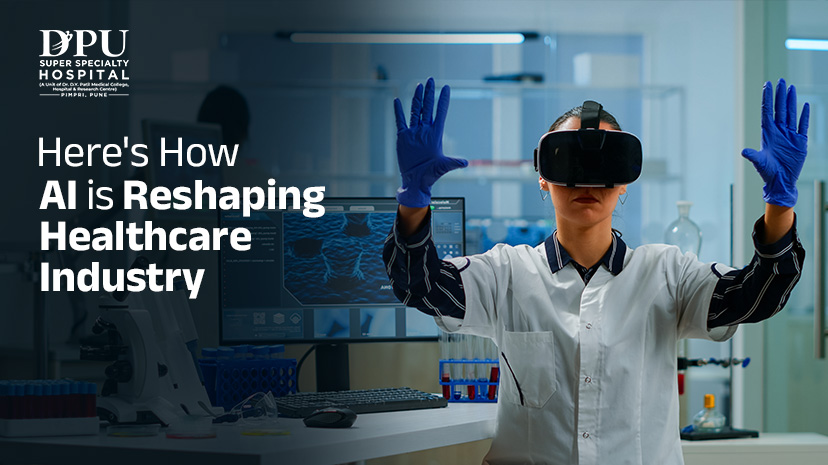Here's how AI is reshaping healthcare industry

At the heart of advancements in healthcare lies a series of pivotal questions: How can diagnostic accuracy be elevated, treatments finely tailored with precision, and health trends effectively predicted? These questions are not merely inquiries; they represent the foundation of a transformative quest that Artificial Intelligence (AI) is vigorously addressing, fundamentally reshaping the healthcare landscape. As we embark on this intellectual exploration, let's delve into the latent potential of AI in healthcare by dissecting these fundamental queries and employing analogies to vividly illustrate the revolutionary impact of this technology.
Can AI redefine diagnostics?
What if we had a digital detective with an unparalleled ability to analyse and interpret complex medical data?
Consider AI as the Sherlock Holmes of Medicine, armed not with a magnifying glass, but with machine learning algorithms and image recognition capabilities. AI in diagnostics serves as an astute investigator, delving into medical images and patterns with an uncanny ability to identify subtle anomalies. This capability is showcased in platforms such as Aidoc, where it rapidly analyses CT scans and identifies potential issues, such as intracranial bleeding. In this analogy, AI takes on the role of a detective endowed with acute attention to detail, expediting the diagnostic process and potentially preserving lives through its swift insights.
How can AI make healthcare treatments personalised?
How can we go beyond generic prescriptions and offer treatments tailored to individual characteristics, like a bespoke suit that perfectly fits its wearer?
Enter AI as the master tailor of personalised medicine. Much like crafting a bespoke suit requires intricate measurements, AI analyses vast datasets, encompassing genetic information and Electronic Health Records (EHR). IBM Watson for Oncology serves as an example of this idea, working like a tailor that creates treatment suggestions based on a patient's specific cancer details. Imagine AI as a skilled tailor, making sure healthcare treatments fit each person precisely, making them work better and causing fewer side effects.
Can AI redefine surgical precision in healthcare?
Hospitals that have adapted to robotic surgery have really changed the face of surgery. In the domain of surgery, AI, especially in robotic procedures like the da Vinci Surgical System, transforms precision. Imagine a surgical virtuoso – these robotic systems extend surgeons' capabilities, ensuring unparalleled accuracy and efficiency. Guided by AI algorithms, they analyse real-time data, minimising invasiveness and accelerating patient recovery. This harmonious blend of technology and surgical finesse heralds a future where each procedure is a symphony of precision, optimising patient outcomes.
How can AI be the efficiency booster in the healthcare?
Can AI function as the conductor, ensuring a seamless symphony of medical processes?
Imagine AI as the conductor of the healthcare orchestra, simplifying tasks and cutting down on administrative hassles. Babylon Health's AI chatbot serves as the lead violinist, allowing users to input symptoms and receive instant health advice.
What safeguards are in place to ensure the ethical use of AI?
As AI becomes a crucial aspect of healthcare, ensuring ethical practices and safeguarding data security becomes of utmost importance. How can we guarantee the responsible handling of patient data, protecting it as securely as a vault guards precious treasures?
Think of the ethical use of AI in healthcare as comparable to securing treasures within a vault. Instances such as Google's DeepMind sharing patient data with the Royal Free NHS Trust underscore the significance of clear data-sharing agreements. Similar to a vault with stringent access controls, implementing robust regulations and protocols is essential to ensure the responsible use and safeguarding of patient data in the AI-driven healthcare landscape.
Can AI seamlessly integrate into existing healthcare systems?
Incorporating AI into current healthcare systems is like renovating a historic building. How can we guarantee a smooth integration of AI that improves, rather than disrupts, the core foundations of healthcare infrastructure?
Think of AI integration as a skilled architect renovating a historic structure. Epic Systems' challenges in integrating third-party AI applications highlight the importance of meticulous planning and collaboration. Like an architect working within the constraints of a historic building, addressing compatibility issues and ensuring a harmonious blend of AI with existing systems is crucial for a successful integration that enhances rather than disrupts healthcare operations.
How can AI keep advancing in healthcare?
The journey of AI evolution in healthcare takes us into unknown territories. How can AI persist in navigating this landscape, uncovering new possibilities much like an explorer venturing into uncharted territories?
Picture AI as the adventurous explorer in the medical landscape, always on the lookout for new frontiers. The dynamic evolution of AI in healthcare is comparable to an explorer discovering hidden treasures. Whether it's refining existing applications or uncovering entirely new possibilities, AI acts as the guiding compass leading the healthcare industry into uncharted territories, promising ongoing innovation and advancements.
The impactful role of AI in healthcare becomes clear, from diagnostic, treatments, and efficiency, to even robotic surgery hospitals.
This envisioned future is marked by precision, efficiency, ethical considerations, and a continual exploration of new possibilities – a future where AI becomes a reliable ally in the quest for enhanced patient care and well-being.









